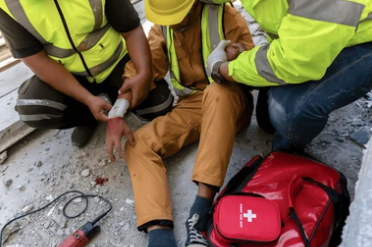 An injury at the workplace/SCREENGRAB
An injury at the workplace/SCREENGRABIn Kenya, the Work Injury Benefits Act (WIBA), 2007, governs compensation for injuries sustained in the course of employment.
It is the primary legislation that outlines how employees
should be protected when they suffer work-related accidents, disabilities, or
occupational diseases.
The Act, which came into force on June 2, 2008, replaced the former Workmen’s Compensation Act and significantly modernised the country’s approach to workplace safety and compensation.
It applies to all employees working under a contract of service or apprenticeship, whether local or foreign, and covers individuals employed in both the private sector and government institutions.
The only category excluded from coverage is members of the armed forces, whose compensation arrangements are handled separately under military-specific laws.
Under WIBA, the responsibility for ensuring that employees are protected in the event of a workplace injury lies squarely with the employer.
All employers in Kenya are legally required to take out a WIBA-compliant insurance policy to cover their workforce against work-related injuries, occupational diseases, permanent disability, or death.
Failure by an employer to provide adequate insurance is not only a violation of the Act but also a criminal offence.
The law places strict obligations on employers to report workplace injuries promptly and to ensure that affected employees receive the benefits they are legally entitled to.
Compensation under WIBA covers a broad range of scenarios, provided that the injury, illness, or death arose out of and in the course of employment. This includes accidents that occur at the workplace or during working hours, as well as incidents that happen while an employee is carrying out duties assigned by their employer, even if outside the usual place of work.
The Act also covers injuries sustained while an employee is being transported to or from work in a vehicle provided by the employer.
Furthermore, employees on local or overseas assignments and
those working under flexible work arrangements agreed upon with their employers
remain eligible for compensation.
The Act also recognises occupational diseases—conditions contracted due to exposure to harmful biological or chemical agents at the workplace. Employees who develop such illnesses are entitled to compensation if the disease can be linked directly to their work environment or job activities.
In instances where an employee dies as a result of a workplace injury or occupational disease, dependants of the deceased are allowed to file compensation claims on behalf of the employee, ensuring that families are not left without support following a tragedy.
However, WIBA contains important limitations. An employee is not entitled to compensation if an accident that does not result in serious disablement or death is proven to have been caused by the deliberate or willful misconduct of the employee.
The law also requires that claims be made within 12 months of the accident or discovery of the occupational disease, although the Director of Occupational Safety and Health Services (DOSHS) may allow exceptions under certain circumstances.
One of the noteworthy features of the Act is its approach to fault. WIBA operates on a no-fault basis, meaning that an employee does not have to prove negligence on the part of the employer to receive compensation.
Instead, the focus is on whether the injury or illness occurred in the course of employment. Interestingly, WIBA still allows compensation even in cases where an employee was acting in contravention of company rules or instructions at the time of the incident.
If the action was performed in connection with the employer’s business or for the benefit of the employer, the accident is still deemed to have arisen out of and in the course of employment, provided it resulted in serious disablement or death.
Compensation awarded under WIBA depends on the nature and severity of the injury, as well as the employee’s earnings.
“Compensation awarded under WIBA depends on the nature and
severity of the injury, as well as the employee’s earnings,” State Department
for Labour and Skills Development noted in its website
Medical expenses are covered by the employer, and an injured employee is entitled to temporary disability payments during the period they are unable to work, up to a maximum of 52 weeks.
For permanent disablement, the Act provides lump-sum compensation based on a statutory formula, which considers the degree of permanent incapacity and the employee’s monthly earnings.
In the unfortunate event of death, dependants receive a
lump-sum amount calculated using the deceased employee’s income and a
prescribed compensation factor.
Over the years, insurance providers in Kenya have developed products that combine WIBA coverage with Group Personal Accident (GPA) insurance, commonly referred to as WIBAPlus.
While WIBA solely covers injuries and diseases arising out of employment, WIBAPlus extends protection to off-duty accidents, ensuring 24-hour worldwide coverage. This hybrid protection has become increasingly popular among employers seeking to provide comprehensive safety nets for their staff.
In practice, the compensation process begins when an employee is injured. The employer must report the incident to DOSHS and forward the employee for medical treatment.
The employee or their dependants then file a compensation claim through the employer or directly with the relevant authorities. Once the Director of DOSHS assesses the claim and determines the degree of disability or nature of compensation due, the employer or their insurer is obligated to settle the award.
WIBA remains a key legal pillar ensuring that employees who suffer injuries or diseases in the course of their work are treated fairly and compensated adequately.
The Act underscores the importance of accountability, safety, and social protection in employment, offering vital safeguards for the country’s workforce and their families.













